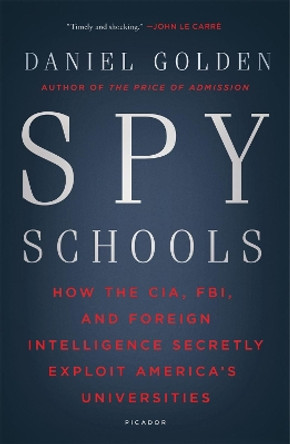Description
There is no longer any doubt of the failure of our intelligence agencies in the years following the Cold War. Amy Zegart has examined the reasons for this failure in addition to the well-meaning but mistaken attempts to address the problem. An important book for all those interested in the nation's security. -- Thomas H. Kean, chairman of the 9/11 Commission and former governor of New Jersey Spying Blind is a timely and sweeping overview of the organizational challenges confronting our intelligence agencies in an age of terrorism. Amy Zegart has written a comprehensive and engaging book that will be of interest to anyone who seeks a better understanding of America's national-security agencies. -- Lee Hamilton, president of the Woodrow Wilson International Center for Scholars and former chairman of the House Permanent Select Committee on Intelligence Amy Zegart has written a pathbreaking book--picking a path through the rubble of countless reform commissions, congressional committees, and expert reports on how to adapt U.S. intelligence infrastructure to a post-Cold War, post-9/11 world. It is essential reading for anyone concerned with the theory or practice of national security in the twenty-first century. -- Anne-Marie Slaughter, dean of the Woodrow Wilson School of Public and International Affairs at Princeton University Amy Zegart believes, quite rightly, that even six years after the terrorist attacks the government of the United States continues to be plagued by deep-seated institutional deficiencies within the community of intelligence agencies. This outstanding book, clearly written and exhaustively researched, stands as a major contribution to our understanding of why this is the case, and what can be done about it. -- Loch K. Johnson, University of Georgia Spying Blind is both a clarion call for organizational reform of the intelligence community and a sober warning that effective reforms will not be forthcoming unless Congress also changes the way it manages our intelligence agencies. -- Scott D. Sagan, Stanford University An outstanding demonstration of how the adaptation failures of the CIA and FBI before and after 9/11 lie in deep-rooted organizational deficiencies and not individuals asleep at the switch. -- Graham Allison, Harvard University Professor Zegart's work is breathtaking in scope and revolutionary. This is the first effort to put the CIA and other intelligence agencies under the microscope of social science. -- Gary Hart, former senator and chairman of the U.S. Commission on National Security in the 21st Century This is an excellent book. The writing is gracious and many of the turns of phrase are both eye-catching and very satisfying. The documentation is extensive but straightforward and not cumbersome. The book moves along briskly--a good read. This is not common in the political-science literature and certainly not with a subject matter such as intelligence. -- Charles Perrow, author of "The Next Catastrophe" The book's central argument is that the U.S. intelligence agencies did not adapt to the changed world after the cold war and have not shown much sign of adapting even after 9/11. While most academics hedge in language, Zegart's is straightforward. The writing is very clean and readable. The book rests on a lot of research. -- Gregory F. Treverton, author of "Reshaping National Intelligence for an Age of Information"
About the Author
Amy B. Zegart is associate professor of public policy at the University of California, Los Angeles. She is the author of "Flawed by Design: The Evolution of the CIA, JCS, and NSC".
Reviews
Co-Winner of the 2008 Louis Brownlow Award, National Academy of Public Administration "Ever since the end of the cold war, the Central Intelligence Agency, the Federal Bureau of Investigation, the National Security Agency, and more than a dozen other intelligence organizations that answer to the president had been struggling to adapt their sources and methods to the new menace. As Amy B. Zegart argues in Spying Blind, they just weren't up to the job... Zegart, blaming institutional inertia more than individuals, counts more than 20 specific instances where the CIA or the FBI missed chances to stop the 9/11 attacks."--Christopher Dickey, Newsweek "Don't be fooled by the title of this book. It sounds as if the author is going to tread the same turf as Richard Clarke, Tim Weiner, Bob Woodward and a host of others, including the 9/11 Commission Report, but Amy Zegart in Spying Blind goes several steps beyond her predecessors... Zegart presents the facts behind this state of affairs in a more scholarly way than we've previously seen, by examining over 300 intelligence reform recommendations and by tracing the history of CIA and FBI counter-terrorism efforts from 1991 to 2001. ... Spying Blind provides a clear and comprehensive overview of a dire situation -- the kind of knowledge that comes in handy when you call or write your congressman or, for that matter, when you vote."--Mary Welp, The Courier-Journal "Zegart argues that any meaningful improvement in U.S. intelligence coordination and effectiveness will require the president and Congress to take on the Defense Department... Spying Blind is a thorough examination of those reform failures. In it, Zegart sifts through hundreds of intelligence recommendations...and findings by the 9/11 Commission and congressional committees."--David J. Garrow, Wilson Quarterly "One of the many strengths of Zegart's book is that she examines not only current problems in the intelligence services but past efforts to correct them."--Simon Chesterman, Survival "Amy B. Zegart is one of the most talented young scholars in the field of intelligence studies. She has a flair for empirical research... [T]his highly readable and well-documented book is commendable for its exhaustive research and lucid writing style."--Loch K. Johnson, Political Science Quarterly "This is a well-written and informed book that should become part of the post-9/11 debate on intelligence agencies and their adaptation to the new world that opened up on that day... This is all excellent book, with detailed research, and a highly readable presentation of absorbing analysis."--Alan Warburton, International History Review "Spying Blind adds a valuable empirical study to the literature on understanding culture and bureaucratic processes in foreign policy decision-making."--Peter Hough, European Legacy
Awards
Joint winner of National Academy of Public Administration Louis Brownlow Award 2008.
Book Information
ISBN 9780691141039
Author Amy B. Zegart
Format Paperback
Page Count 336
Imprint Princeton University Press
Publisher Princeton University Press
Weight(grams) 482g









